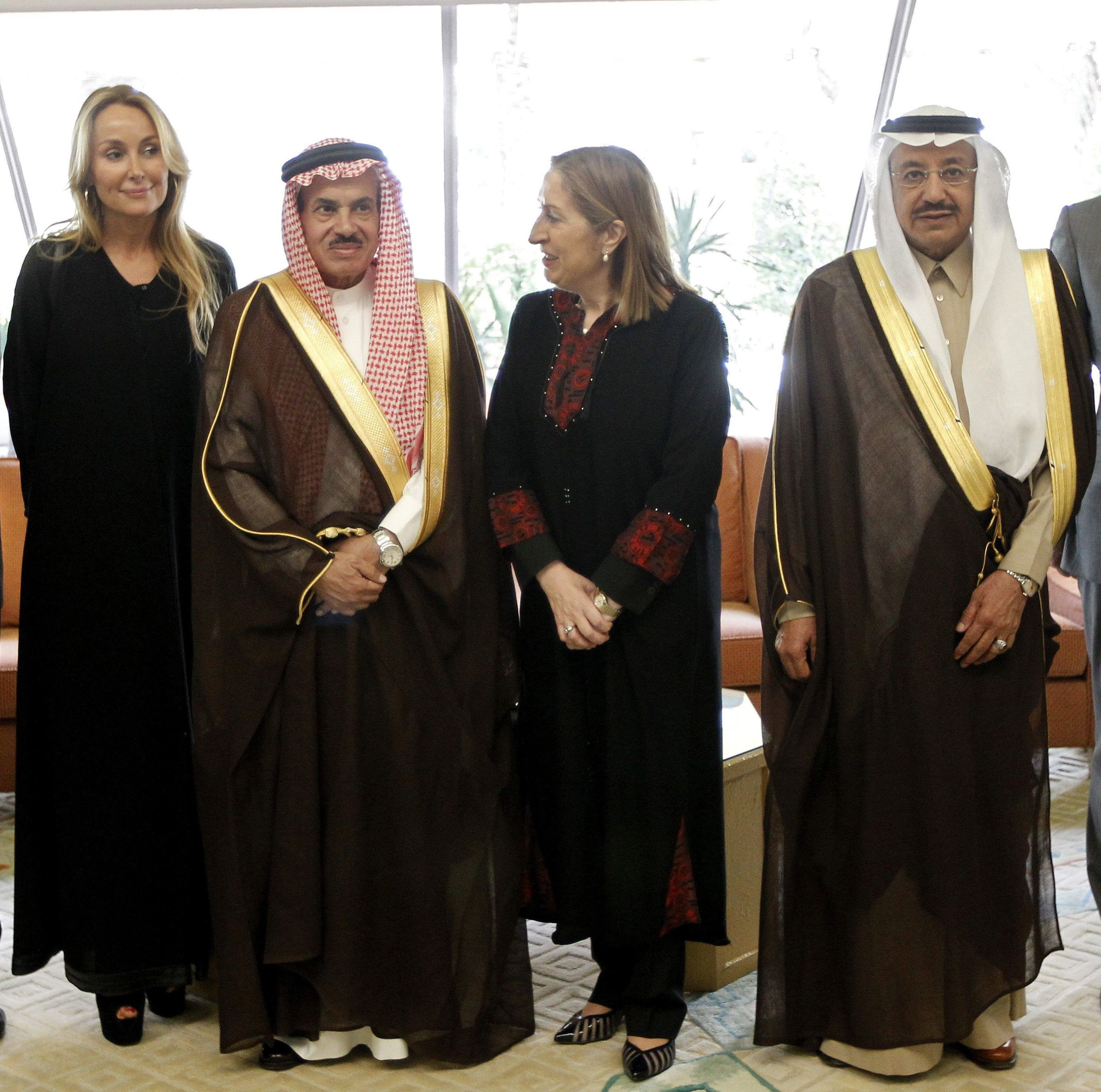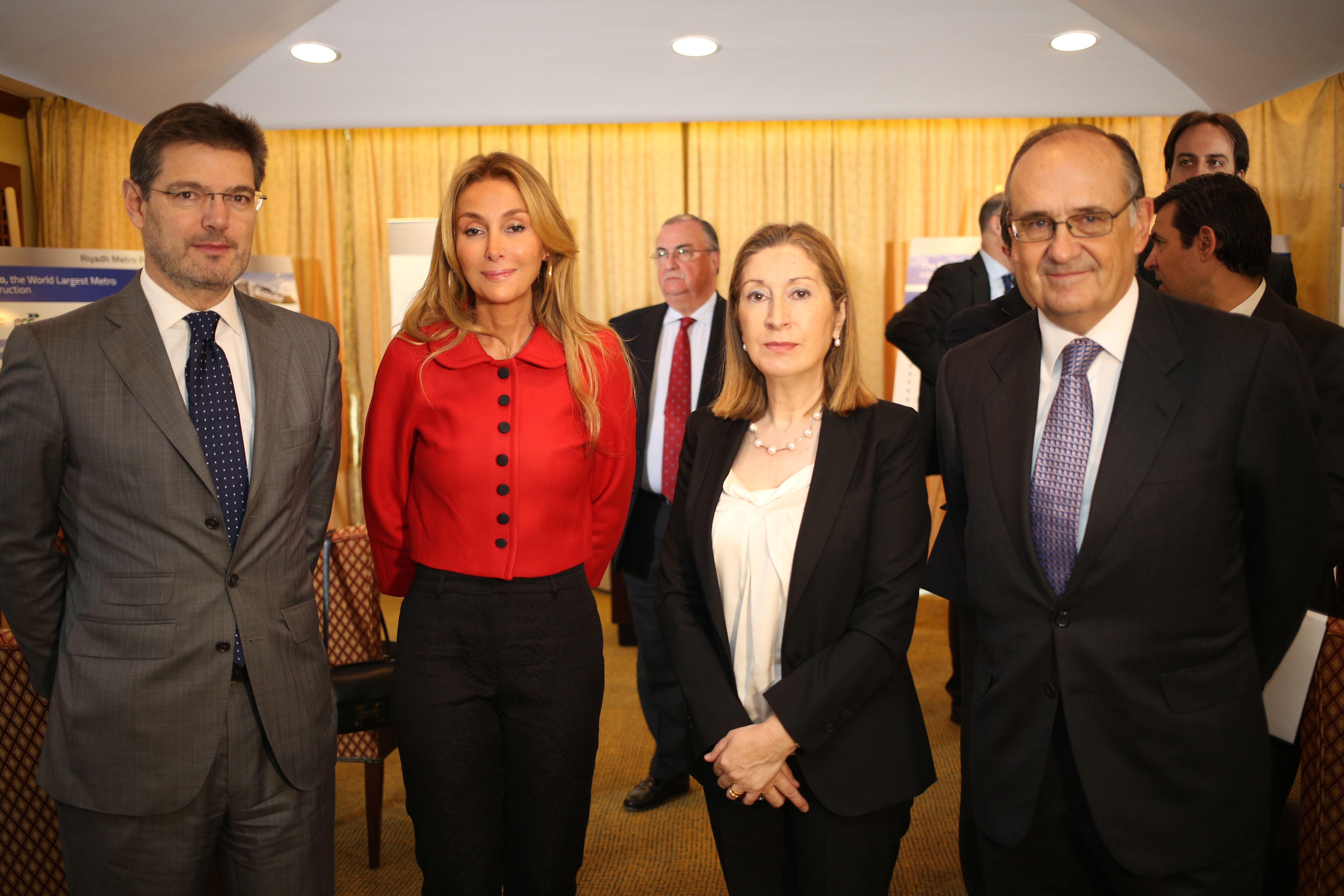Spain's Infrastructure Minister meets FCC's Chairman and CEO in Riyadh to discuss the subway project
15/02/2014

Spain's Infrastructure Minister meets FCC's Chairman and CEO in Riyadh to discuss the subway project
Esther Alcocer Koplowitz and Juan Béjar met with Ana Pastor to inform her about the characteristics and schedule of the longest subway system under development in the world, construction which will commence by mid-2014, will create more than 15,000 jobs

Spain's Infrastructure Minister, Ana Pastor, met in Riyadh this morning with FCC Chairman, Esther Alcocer Koplowitz, and Vice-Chairman and CEO, Juan Béjar, to discuss the details and schedule of the project for three new lines of the Riyadh subway, in Saudi Arabia, which are being built by a consortium led by FCC.
The total budget for designing and building the 175-kilometre subway system exceeds 16.3 billion euro. FCC, the Citizen Services group, is leading the FAST consortium, which is building lines 4, 5 and 6 for 6 billion euro. FCC's main consortium partners are Korean company Samsung and French company Alstom. The other members are Strukton (The Netherlands), Freyssinet Saudi Arabia, Typsa (Spain), Atkins (UK), and Setec (France).
In a meeting at the Spanish Embassy in Riyadh, senior management from FCC discussed in detail with Pastor the work that has been done since the contract was awarded at the end of July 2013. Thus far, geological studies and terrain exploration have been completed, in line with the proposed calendar. At the meeting were Joaquín Pérez-Villanueva, the Spanish Ambassador in Saudi Arabia; Alicia Alcocer Koplowitz, Chairman of FCC; Juan Béjar, Vice-Chairman of FCC; Miguel Jurado, General Manager of Construction at FCC; and Jaime Freyre de Andrade, director of the consortium.
The consortium team in Riyadh numbers around 160 people, around 40 of whom are FCC employees from Spain. Another 220 people are located in Madrid, Paris, London, New Delhi and Dubai to provide support for the project. In total, FAST will employ over 15,000 people from more than 15 countries. FCC expects FAST to commence construction of the three subway lines by mid-2014, and to complete the project within five years.
The contract includes the design and construction of lines 4 (orenge), 5 (yellow) and 6 (purple), which will have 25 stations. Construction will include 65 kilometres of track: 24 kilometres of viaducts, 28 kilometres of underground track, and 13 kilometres of overground track. A total of 69 driverless trains will also be built to operate on these three lines.
The largest subway project in the world
The six lines comprising the Riyadh metro project will span more than 175 kilometres, making it the largest subway under development in the world at present. Construction will require 600,000 tonnes of steel (80 times the amount used to build the Eiffel Tower), 4.3 million cubic metres of concrete (11 times the amount used for Burj Khalifa, the world's tallest skyscraper), and more than 60,000 workers.
This new metro will transform Riyadh, reducing traffic congestion, strengthening and driving the Saudi economy and improving living standards for citizens.
Riyadh currently has a population of 5.7 million, which is expected to reach 8.3 million by 2030, according to official calculations. The subway is a solution to daily traffic problems: of 7.4 million daily commutes, only 2% use public transport.
Experience in Saudi Arabia
FCC has been operating since 2011 in Saudi Arabia, where FCC Aqualia optimised Riyadh's water supply network (6,000 kilometres long). This project has created 160 jobs and will improve the services provided to more than 3 million people.
This was the first water management contract granted to a Spanish company in the Middle East. A few months later, FCC Aqualia was awarded another contract, this time to operate and maintain the sewers and sewage treatment system in eastern Abu Dhabi (UAE).
FCC also has offices in Qatar, where it is currently building two pedestrian walkways as well as phase II development of the Barzan camp residential area in Al Wajba, 15 kilometres from the capital city. It has also built other landmark projects in the zone, such as the Dubai Cricket Stadium.
Extensive experience in subway construction
The company is currently building line 1 of the Panama metro, which is scheduled to open soon, at a cost over 1 billion euro; the Toronto-York Spadina Subway Extension (TYSSE) in Canada, which includes construction of the North tunnels and the Highway 407 Station and is worth 304 million euro; and section 1 of Bucharest Metro's line 5 (Romania), for 267 million euro. It is also building the metro in Málaga and line 9 of Barcelona's Metro in Spain.









